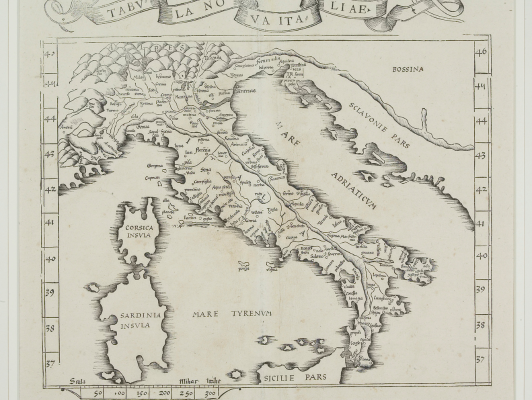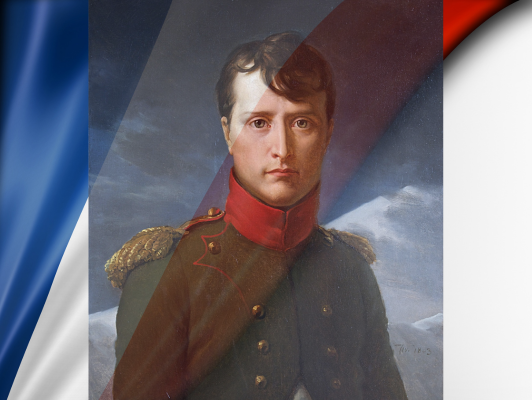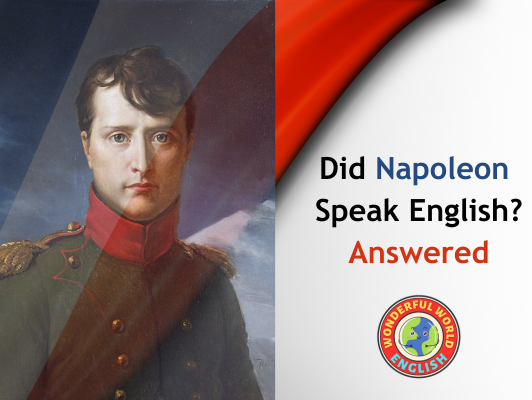Contents
Toggle
Meet David De’ Ath, founder, editor, and writer at Wonderful World English. With his extensive background as an English teacher, David provides valuable insights and practical tips on ESL for students and teachers alike.
Napoleon Bonaparte, the illustrious French military leader and emperor, had linguistic skills beyond his native tongue.
His command of languages embraced French, Corsican, and Italian, the latter connecting to his birthplace on the island of Corsica.
As he rose to prominence during the French Revolution and subsequently assumed power in France, his linguistic prowess played a role in his ability to lead and communicate effectively.
During Napoleon’s exile in Saint Helena, after he fell from power, he took to learning English.
The remote island’s isolation from French-speaking territories necessitated an understanding of English for the deposed emperor.
His English studies were not merely a hobby but a practical response to his circumstances, showing his continued willingness to adapt and learn.
It was reported that while his grasp of English improved, he remained more comfortable with French, the language of his reign and command.
Napoleon’s engagement with the English language underscores a facet of his life in exile often overshadowed by his military and political legacies.
His language learning was both a personal challenge and a means of integrating into his new environment in Saint Helena.
Although he pursued English with dedication, he never mastered it to the extent of his native French.

Napoleon’s Linguistic Abilities
Napoleon Bonaparte’s linguistic prowess reflected his strategic mind, with abilities that extended beyond military endeavors.
His command of languages evolved significantly from his early years, through his reign, and into his period of exile.
Early Life and Education
Born on the island of Corsica, Napoleon’s first language was Italian.
He later learned French when he was sent to military school in mainland France, where he initially spoke with a marked Corsican accent.
His early education was pivotal in his mastery of French, which eventually became his primary language of command in the French Army.
Language Skills During Reign
While he ruled the French Empire, Napoleon predominantly used French to consolidate his power across Europe.
Although he understood Italian, French was the language of the administration and the military.
Little evidence suggests that he communicated proficiently in any other European languages during this time.
France is a popular destination for teachers of English as a Second Language (ESL).
For a complete guide on becoming an English teacher in France, check out the link below!
Related: How to Teach English in France: Your Ultimate Guide
Exile and Communication
During his exile to Saint Helena, Napoleon faced a considerable language barrier with the British officers and inhabitants of the island.
It was here that he attempted to learn English, seeking to read, write, and communicate without the assistance of an interpreter.
With the help of Count Emmanuel de Las Cases, who documented their efforts in the Mémorial de Sainte-Hélène, Napoleon made some progress in English.
Historical Evidence and Anecdotes
The surviving writings evidence Napoleon’s endeavor to learn English, including his attempts at translation aboard the HMS Northumberland and on Saint Helena.
However, despite his intelligence, he struggled with vocabulary and pronunciation, suggesting that he never attained fluency in English.
Reports from his contemporaries, like Count Emmanuel de Las Cases, illustrate Napoleon’s difficulties while transitioning to a new language.

Cultural and Historical Context
The friction between Napoleon’s France and the British during and after the French Revolution played a pivotal role in Napoleon’s linguistic journey, especially his attempts to learn English.
His exile after the Battle of Waterloo magnified personal and diplomatic communications between him and the British, revealing the respective cultures’ deep imprints on each other.
Napoleon’s France and the British
Napoleon Bonaparte’s era was marked by the tumultuous aftermath of the French Revolution, where he rose to power amidst the chaos, crowning himself as Emperor of France.
His ambitions led to widespread reforms within France, which transformed the French Republic and influenced similar upheavals across Europe.
However, Napoleon’s quest for power inevitably set him against the British, who were staunch defenders of the old monarchical order and stood as his most enduring enemies.
The climax of this struggle was epitomized at the Battle of Waterloo, which ended Napoleon’s reign and reshaped Europe’s geopolitical landscape.
English is now widely spoken around the world, not least in Europe.
For insights into English proficiency within the European Union, check out the guide below!
Related: English-Speaking Countries in the EU – Top 10
Personal Relationships and Correspondence
While Napoleon is often remembered for his military and political maneuvers, his personal relationships and attempts at building diplomatic bridges through letters were equally important.
He had a complex relationship with women, most notably with Josephine, his first wife, and their correspondence often reflected a mix of affection and statecraft.
His family was also significant, with his son, Napoleon II, central to his legacy.
Despite his fall from power, Napoleon’s correspondence with British notables showcases his struggle with the English language and sheds light on his personal characteristics, such as his distinct Corsican accent.
Though primarily known for speaking French and Corsican, with some knowledge of Italian, his determination to learn English is evidenced by notes from his teacher on St. Helena, revealing the humanity of a man more often seen only in the context of his towering historical persona.

Conclusion
Napoleon Bonaparte’s linguistic journey reflects his adaptability and determination.
Born in Corsica, he initially spoke Italian, then mastered French, which became his primary language for command during his reign.
Despite his proficiency in French and understanding of Italian, there’s little evidence of his fluency in other European languages.
Napoleon’s exile to Saint Helena marked a pivotal linguistic challenge. Faced with a predominantly English-speaking environment, he endeavored to learn English.
Assisted by Count Emmanuel de Las Cases, he made some progress but never achieved fluency.
This period highlights his willingness to adapt to new circumstances, even in the face of difficulty.
Overall, Napoleon’s engagement with languages, particularly his attempts to learn English during exile, offers insight into a less explored aspect of his character – that of a lifelong learner continuously adapting to his surroundings.
We hope you found value in this information.
Have a wonderful day!
Image Attribution: All images licensed via canva.com





